- Home
- Terry Brooks
The Skaar Invasion Page 30
The Skaar Invasion Read online
Page 30
Soon the Federation camp was growing steadily quieter and the presence of those soldiers still living was diminishing. The sounds of death and dying faded, and only the pounding of the rain and the crackle of the flames engulfing the Federation airships remained.
Ajin was standing at the center of the carnage, watching as the last few of the enemy soldiers were sent to their deaths, when one of her junior officers appeared.
“Princess,” he said, dropping to one knee.
“Ke’Rija,” she acknowledged, giving him her hand to kiss.
She saw the warmth in his eyes as his gaze lifted to meet hers, saw the flush in his rain-streaked face. She never forgot a soldier’s name, and such a small thing carried a great reward.
“We have a prisoner,” Ke’Rija said, rising as she gestured. “His guards fought hard to protect him from us, but failed. We think he might be the army’s leader.”
“The first commander?”
“He won’t say, but we think so.”
“Show me,” she said.
They walked through the killing ground to the back of the encampment, where a small cluster of soldiers was gathered about a man who had been forced to his knees in the mud. His head was hanging down, his hair fallen forward over his face, and his hands tied behind his back.
She took it all in and then turned to Ke’Rija. “Find Kol’Dre. Ask him to attend me.”
Ke’Rija hurried away. Ajin stood looking at the prisoner. He was beaten and humiliated, unable even to look at her. She did not know if this was Arraxin Dresch. She needed Kol to confirm it; he had accumulated knowledge of such things from his time in the Four Lands previous to her arrival. She glanced toward the river while she waited, noting a sudden absence of sound. The killing was over. The battle was finished. She considered what she had done, but did not regret it.
Minutes passed, and then Kol’Dre appeared. He was soaked to the skin and covered in blood, but his gaze was steady. She pointed at the prisoner, and the Penetrator bent to lift the other’s chin, studied his face a moment, and then stepped back.
“First Commander Dresch,” he said to the man. “You seem dispirited.”
The prisoner said nothing. He was clearly waiting to be executed, expecting it, perhaps even welcoming it. Ajin debated. Should she let him live? If she did, he would return to Arishaig and report on what had happened here, a witness to the carnage. And a firsthand report would carry weight with those who heard it. It would serve as a testament to what the Skaar could do to a superior force.
But it would also provide Dresch with an opportunity to set the record straight. He would tell of the false message he had received. He would reveal how a trap had been set to destroy the entire advance force by luring it into an ill-advised attack. Or if he chose to keep all of that to himself to avoid the attendant shame it would heap on him, he would likely be executed for acting precipitously. Or executed simply to provide an example of what could happen to those who failed so badly.
Nothing good would happen to him if he lived. And the benefit to her would be negligible. She looked down on his broken body with a twinge of pity. Better to end it here.
She nodded to Ke’Rija, gesturing toward his sword. He gave her a questioning look, then saw the determination in her eyes and drew his blade. Stepping to one side of Dresch, he lifted his weapon overhead and in a single swift stroke brought it down again.
Arraxin Dresch’s head toppled away, and his body slumped forward.
“Finish up,” she ordered Kol. “Gather up the bodies and burn them. Strip the airships of anything useful. Bring our aquaswifts over to carry back our soldiers. Tonight we celebrate the beginning of the end of the Federation.”
TWENTY-FIVE
Shea Ohmsford stared at the gambler who called himself Rocan Arneas and who now claimed to be involved in an enterprise that would change the world and wondered if the man was perhaps delusional. His strengths seemed to revolve around gaming and an ability to relieve almost anyone willing to play with him of their credits. And he was in possession of some sort of machine that might conceivably do almost anything, given its strange configuration. Nothing the boy had seen or heard so far had done much to convince him that this whole business wasn’t simply a lot of hot air and unreasonable expectations.
Not for the first time, he thought it might be time to fold up his tent, pocket the credits the man had already paid him, and slip away into the night.
“I see doubt in your eyes, young Shea Ohmsford,” the other said suddenly, as if reading his thoughts. “You think I am a braggart or a fool, a man somehow self-deceived into believing the impossible. You think you have heard nothing but words and have seen no proof of anything. Am I right?”
The boy shuffled his feet, measuring the distance to the doors through which they had entered earlier and judging how far it was from there to the street outside. He shrugged. “If you were me, what would you think?”
Rocan did not laugh. Instead, he gestured toward a bench to one side of the strange machine. “Sit with me a few minutes before you finish passing judgment. Let me try to convince you I am more than my words would suggest.”
He moved over to the bench, leaving a clear path to the doorway leading out of the cavernous chamber. He sat and looked back at Shea, who was still standing where he had been left. The boy hesitated, then joined him on the bench.
Rocan studied him a moment. “Do you know why I brought you to Arishaig with me? I mean, why I really brought you?”
Shea shook his head. “Probably not.”
“For all the reasons I told you before, of course. Those weren’t lies I spoke; they were promises. But while they were honest, they weren’t the entire truth. Tell me, does your name mean anything at all to you?”
Another shake of his head, but Shea was wondering by now where this was leading.
“And you don’t know how you got it? No one ever told you?”
“I’m an orphan. No one ever told me anything. I never knew my parents. I was on the streets before I was five years old. I had some people who helped me, a friend or two to protect me. I learned how to look after myself otherwise. I don’t know anything about my name.”
Rocan sat back, drawing one leg up on the bench and placing it between them in a gesture that suggested both a distancing and a reflection.
“Your name is a famous one, my young friend. You are named after one of the most important young men ever to walk the Four Lands. You must have heard of the Wars of the Races? Of the Warlock Lord and his Skull Bearers?”
“Some. Not much. That was a long time ago.”
Rocan’s eyes assumed a faraway look. “A very long time ago. But I know the history well. It is a tribute to my people’s culture that we consider it important to preserve our history through storytelling, and we keep those stories close as the generations pass. I am of Rover blood—all the way back to the time when my ancestors survived by their wits and their quick hands, and later by their skill as builders of airships. They mostly inhabited the Westland then, and many still do now. They still build the best airships in all the Four Lands—claims by the Federation notwithstanding.
“When the first Shea Ohmsford walked the Four Lands, he came out of a tiny village called Shady Vale, located just below the Rainbow Lake. And he walked in the company of one of my more famous ancestors, a man named Panamon Creel. Together, they stood against the terrible threat of the Warlock Lord and his Skull Bearers—a threat that would have destroyed everything of value in all these lands and would likely have put an end to the world we live in now.”
“So the Warlock Lord was real?” Shea was still doubtful. “And all that stuff about the War of the Races really happened?”
His companion nodded. “All of it. But here’s what you need to know. I don’t believe in chance, and I don’t believe in luck, but I do believe in fate. It was
no accident that Panamon Creel and Shea Ohmsford ended up as companions on that fateful journey to the Skull Kingdom all those years ago. Fate caused them to meet, and made them friends—friends who would do whatever it took to help each other. It kept them together long enough for each to save the life of the other, and the lives of many more besides.”
He paused, then reached out and tapped Shea on the shoulder. “It was fate that brought you to me, as well, don’t you see? It was fate that placed you in that gambling room, drew my attention, and made me decide to take a chance that you were as ready and able as you appeared. Fate persuaded me you were the one to extricate me from a somewhat dangerous situation, and fate that convinced me to bring you here. I believe that. You and I are meant to be partners and comrades in a grand adventure!”
By now he was so wound up, so enthusiastic about fate and its complicity in his life, that Shea was left speechless. Homeless for so long, used to being dependent on nothing and no one, Shea was not much of a believer in fate. So while this wild-eyed gambler might be certain it played an important role in his life, Shea was much less sure. His experience had taught him that if you wanted things to improve, you had to do it on your own.
Rocan was staring at him with a look that bordered on amusement. “I know what you are thinking. You think I’ve lost my mind. You think I am a dreamer or a fool or worse. But if you stick with me, my young lad, you will find out that what I have just told you is correct. Now, then. Are you ready to hear about my grand scheme, my plans for changing our world and our people? Or are you just going to walk out the door?”
For a moment, Shea knew he was going to make the second choice. And then a bit of movement caught his eye, and when he looked over, there was Seelah, easing along through the shadows on the far side of the room. In the excitement and trauma of the fight to escape their attackers, he had forgotten her. But seeing her again, catching the light dancing in her strange eyes and the smile that curved her lips, he was reminded again of how entranced he was with her. He was not foolish enough to think that it could ever come to anything, but he was also unable to resist his infatuation.
And he didn’t want to give up his chance to spend time with her just yet. He didn’t think Rocan presented any danger, in spite of his wild ideas. What could it hurt to stick around for just another day or so? It would be time spent in the company of Seelah—a pleasure he very much desired.
Suddenly she was there next to him, her golden eyes fixed on him, her slender body leaning close. He stayed where he was as her face neared his, all but hypnotized by those eyes. A rumbling sound filled the air as she pressed close.
Was she purring?
Then she placed her face next to his cheek and licked him with her rough tongue in long, slow, languid laps.
“Enough, Seelah,” Rocan snapped. “He is aware of your affection for him, if not for the cause. Back away.”
The Fae did so reluctantly, her gaze drifting away. In less than five seconds, she had disappeared once more.
Shea brushed at his cheek in spite of himself. “Where does she go when she does that?”
Rocan shrugged. “Not very far. She stays close unless I tell her otherwise. She’s watching you right now. You just can’t see her.”
The boy looked around carefully. His companion was right; he couldn’t see her. “Like a moor cat,” he ventured.
“Which is not surprising, since she has moor cat blood.” He held up his hands quickly. “Don’t ask. At least not now. Are we partners or not? You still haven’t said.”
“All right. For the moment, at least, we’re partners. But if you can’t convince me that whatever it is you intend is worth the time and effort, the partnership is over.”
In the shadows across the room, something moved, catching his attention.
“She’s exploring,” Rocan offered. “She does it all the time. The cat in her, I suppose. Anyway, let me continue with what I started. I still owe you an explanation about what we are going to attempt. I will keep nothing from you, nor use any deceptions to convince you of falsehoods. Just hear me out.”
Shea Ohmsford nodded and gave Rocan his full attention. He had already decided it was the least he could do.
* * *
—
Sitting alone in Drisker Arc’s darkened cottage while Tavo Kaynin slept in the next room, Clizia Porse reached an epiphany. She had returned to the house with Tavo after the confrontation in the forest imp’s underground lair, enraged at losing Tarsha to this creature and his companions, but confident about getting the girl back. It was only a matter of discovering where she had gone and what she intended to do next.
Tavo had wanted to set off in pursuit at once, but Clizia knew better. The Elf and the Blade both had the use of magic, and while Tarsha was weakened and disoriented for the moment, she would not remain that way for long. Together, the three might be a match for her—although having Tavo stand with her in a confrontation appealed to her; he had powerful magic at his command. But he was also borderline insane. His ability to do much more than strike out blindly was likely to overwhelm whatever common sense remained to him. She might have been better off getting rid of him, but she still could not shake the feeling that somehow he would prove useful. He could still be a pawn in this game; only his place on the board and his purpose remained to be determined.
On arriving back at the cottage, she had made him eat and drink a portion of bread and ale and then sent him off to bed. He had been more than willing to obey after unknowingly ingesting the potion she had mixed in—a drug that left him weak and disoriented. Because his behavior was so unpredictable, the trick was to keep him under control until she could figure out what to do with him. But at the moment she needed to think things through.
Starting with the odd demise of the forest imp.
That one still troubled her. An ancient creature with centuries of life behind him and no reason to give his life for a young mortal girl, yet he had done so. Why had he made such a choice? Why had he deliberately chosen to sacrifice himself? That would be impossible for most, but he had managed it effortlessly. What had persuaded him that this was a good idea? Why not just give the girl up and be done with it?
She would likely never know the answers to these questions, and she didn’t like mysteries.
So she shifted her thinking to the three who had escaped her, the ones she intended to track down. They would band together, but where would they go with Drisker locked away inside Paranor? She frowned, the wrinkles on her aged face deepening. A highlander, an Elf, and a young girl from the deep Westland. They had nothing in common but the Druid and the girl’s brother. Would they risk coming back for Tavo after having just escaped Clizia? She didn’t think so. Not without help and a plan for besting her in a fight.
Would they go to Leah? To Arborlon?
It was easy enough to find out, of course. She had marked the girl, and unless Tarsha had discovered it and found a way to remove it, she could be located easily enough.
Suddenly she had a suspicion she knew exactly where they would go. Paranor. Or where Paranor had once stood. Drisker might even have called them there. Somehow he might have found a way to contact them—or maybe just the girl—to tell them what had happened. Which meant that he would know Clizia no longer had the upper hand, because now Tarsha Kaynin was free.
And if he had managed by now to recover the Black Elfstone…
Which was exactly what he had done! Of course he had. Why else would he continue to ignore her?
Yet he wasn’t back in the Four Lands, and if he had the power of the Elfstone at his command, he would have returned at once. So maybe he didn’t have it, but only knew that she didn’t…
She shook her head in frustration. The entire business was a confused mess, and she needed to do something to clear it up before she could be sure of anything.
She rose and w
alked outside and stood on the steps leading out to the roadway, staring into the darkness. If Drisker had found the Black Elfstone, why was he still inside the Keep? Why hadn’t he used the Stone’s magic to return Paranor to the Four Lands and free himself? She needed to answer both questions before she did anything further. How could she do that?
But then, she realized suddenly, she knew.
A smile crossed her sour features, shedding years from her face as it broadened. The scrye orb. If she wanted to get a peek at how things stood, she could use the orb to summon Drisker. Find out where he was. Listen to what he might say. His situation would reveal itself, and then she would know what to do next.
She went into the cottage and took out the orb from where she had hidden it. Then she stopped by Tavo’s bedroom and peered through the doorway to ensure he was still asleep. He was, his breathing deep and even, so she pulled his door closed and went back down the hall.
Once outside again, she sat in the wicker chair and willed the orb to do her bidding. Instantly it brightened. She commanded the magic to connect to its twin, readying herself for the confrontation that would follow.
A few seconds passed. A minute. Two minutes. She grew uneasy.
Then, all at once, Drisker was magnified in the magic’s glow, facing her from within its bright wrapping. “Clizia,” he said in what seemed a pleased tone. “I thought you had abandoned me.”

 The Talismans of Shannara
The Talismans of Shannara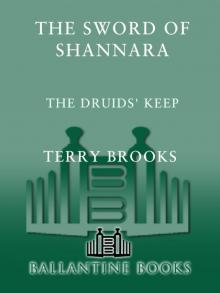 The Sword of Shannara: The Druids' Keep: The Druids' Keep
The Sword of Shannara: The Druids' Keep: The Druids' Keep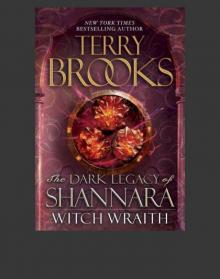 Witch Wraith
Witch Wraith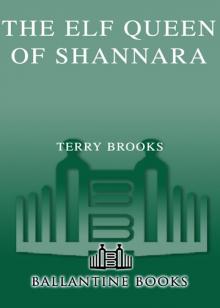 The Elf Queen of Shannara
The Elf Queen of Shannara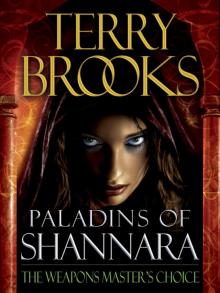 The Weapons Master's Choice
The Weapons Master's Choice The Scions of Shannara
The Scions of Shannara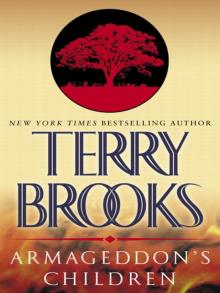 Armageddon's Children
Armageddon's Children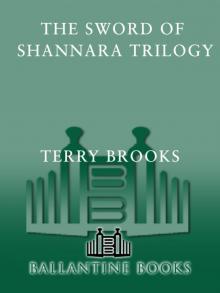 The Sword of Shannara Trilogy the Sword of Shannara Trilogy
The Sword of Shannara Trilogy the Sword of Shannara Trilogy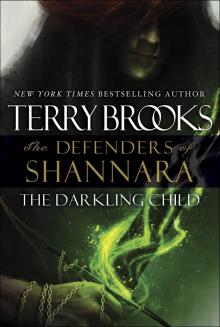 The Darkling Child
The Darkling Child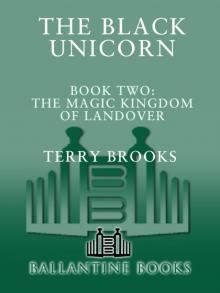 The Black Unicorn
The Black Unicorn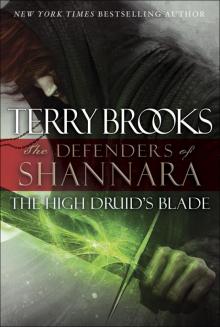 The High Druid's Blade
The High Druid's Blade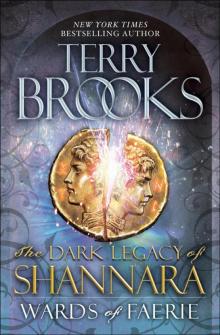 Wards of Faerie
Wards of Faerie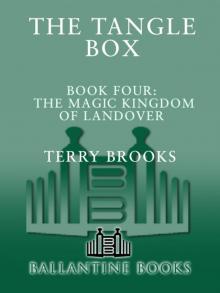 The Tangle Box
The Tangle Box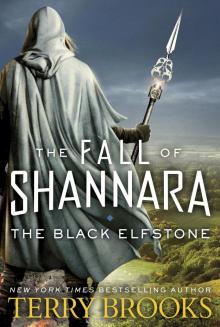 The Black Elfstone
The Black Elfstone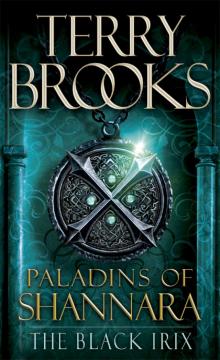 The Black Irix
The Black Irix The Elfstones of Shannara
The Elfstones of Shannara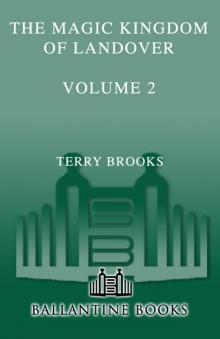 The Magic Kingdom of Landover Volume 2
The Magic Kingdom of Landover Volume 2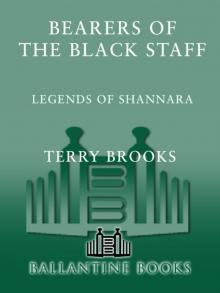 Bearers of the Black Staff
Bearers of the Black Staff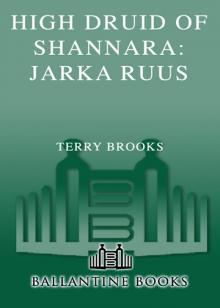 Jarka Ruus
Jarka Ruus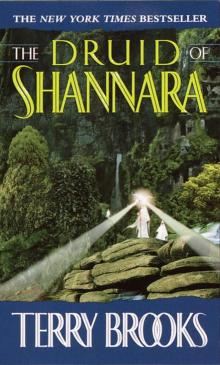 The Druid of Shannara
The Druid of Shannara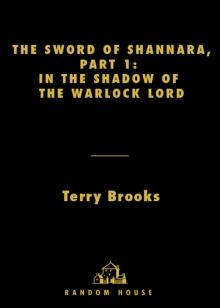 The Sword of Shannara
The Sword of Shannara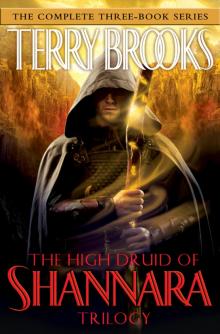 The High Druid of Shannara Trilogy
The High Druid of Shannara Trilogy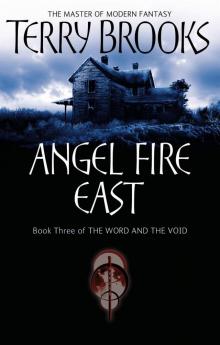 Angel Fire East
Angel Fire East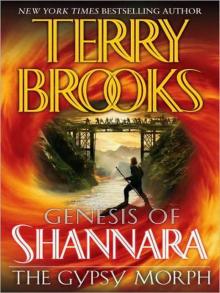 The Gypsy Morph
The Gypsy Morph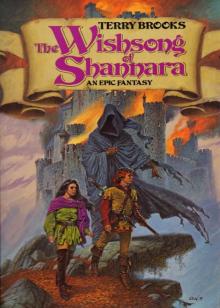 The Wishsong of Shannara
The Wishsong of Shannara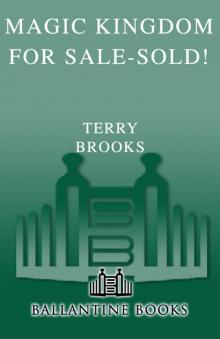 Magic Kingdom for Sale--Sold
Magic Kingdom for Sale--Sold Running With the Demon
Running With the Demon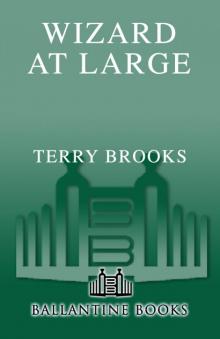 Wizard at Large
Wizard at Large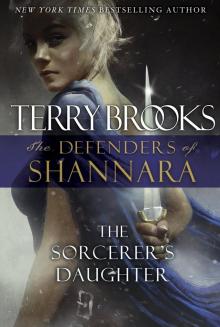 The Sorcerer's Daughter
The Sorcerer's Daughter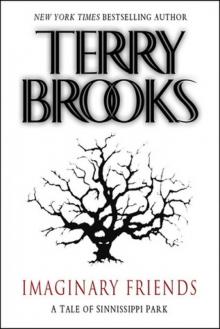 Imaginary Friends
Imaginary Friends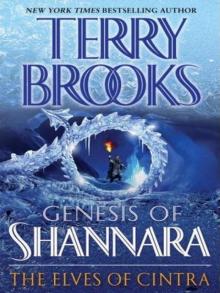 The Elves of Cintra
The Elves of Cintra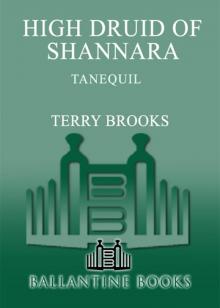 Tanequil
Tanequil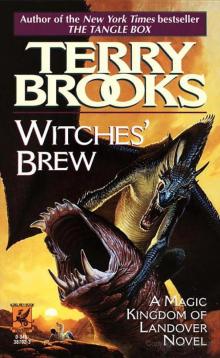 Witches' Brew
Witches' Brew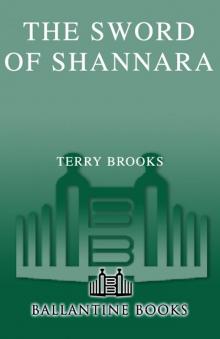 The Sword of the Shannara and the Elfstones of Shannara
The Sword of the Shannara and the Elfstones of Shannara The World of Shannara
The World of Shannara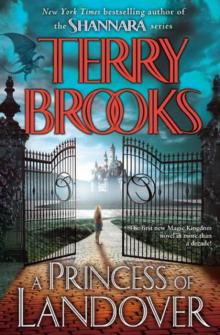 A Princess of Landover
A Princess of Landover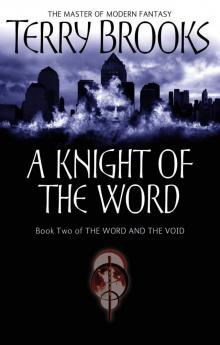 A Knight of the Word
A Knight of the Word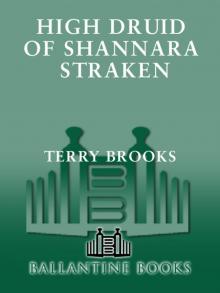 Straken
Straken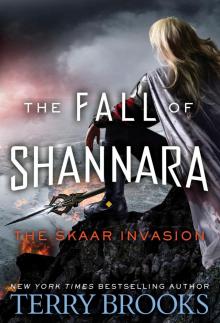 The Skaar Invasion
The Skaar Invasion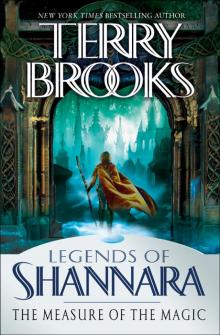 The Measure of the Magic: Legends of Shannara
The Measure of the Magic: Legends of Shannara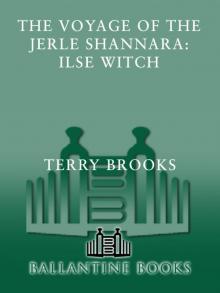 Ilse Witch
Ilse Witch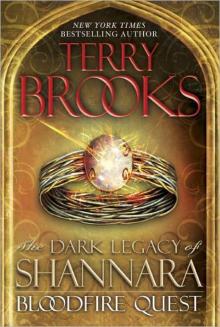 Bloodfire Quest
Bloodfire Quest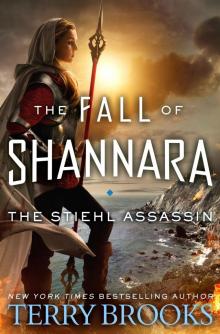 The Stiehl Assassin
The Stiehl Assassin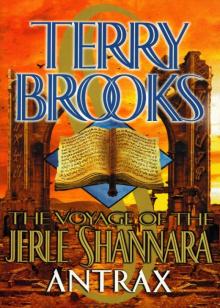 Antrax
Antrax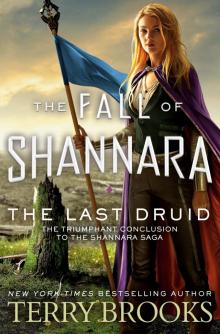 The Last Druid
The Last Druid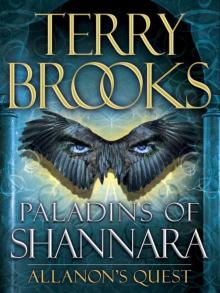 Paladins of Shannara: Allanon's Quest
Paladins of Shannara: Allanon's Quest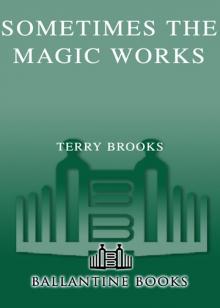 Sometimes the Magic Works: Lessons From a Writing Life
Sometimes the Magic Works: Lessons From a Writing Life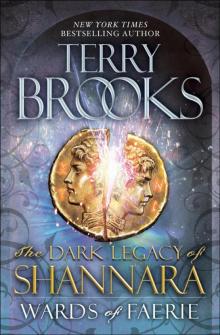 Wards of Faerie: The Dark Legacy of Shannara
Wards of Faerie: The Dark Legacy of Shannara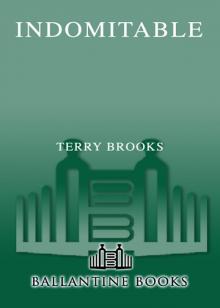 Indomitable: The Epilogue to The Wishsong of Shannara
Indomitable: The Epilogue to The Wishsong of Shannara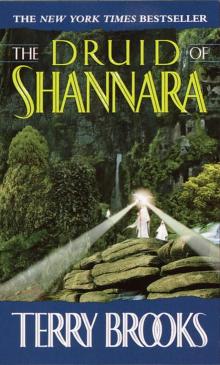 Heritage of Shannara 01 - The Druid of Shannara
Heritage of Shannara 01 - The Druid of Shannara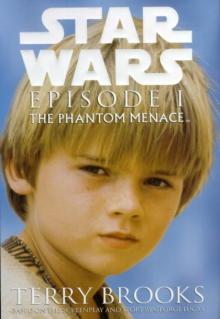 Star Wars - Phantom Menace
Star Wars - Phantom Menace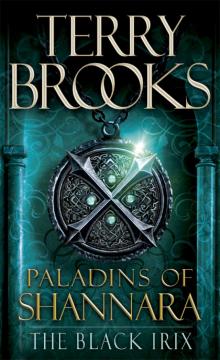 The Dark Legacy of Shannara Trilogy 3-Book Bundle
The Dark Legacy of Shannara Trilogy 3-Book Bundle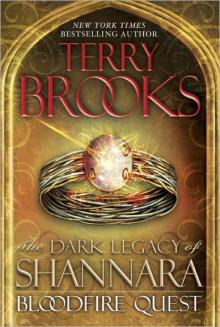 The Bloodfire Quest
The Bloodfire Quest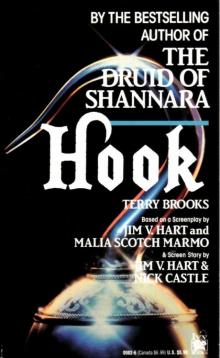 The Hook (1991)
The Hook (1991)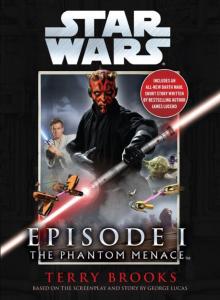 Star Wars: Episode I: The Phantom Menace
Star Wars: Episode I: The Phantom Menace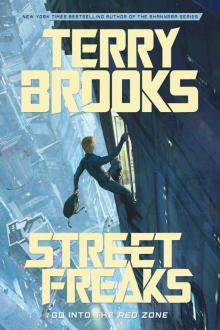 Street Freaks
Street Freaks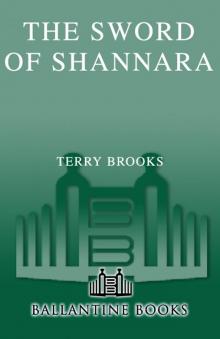 The Sword of Shannara & Elfstones of Shannara
The Sword of Shannara & Elfstones of Shannara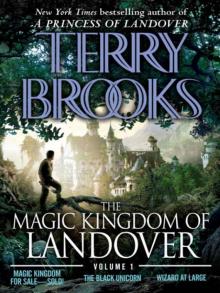 The Magic Kingdom of Landover , Volume 1
The Magic Kingdom of Landover , Volume 1 The Phantom Menace
The Phantom Menace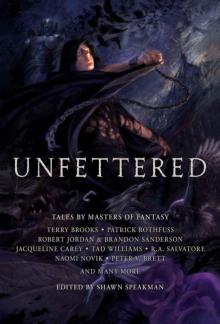 Unfettered
Unfettered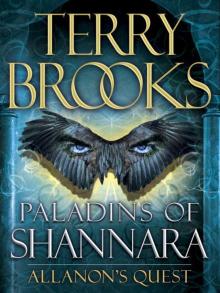 Allanon's Quest
Allanon's Quest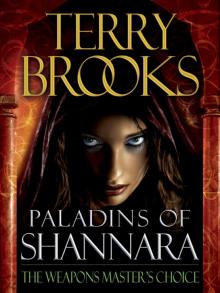 Paladins of Shannara: The Weapons Master's Choice
Paladins of Shannara: The Weapons Master's Choice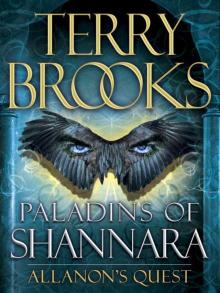 Terry Brooks - Paladins of Shannara - Allanon's Quest (Short Story)
Terry Brooks - Paladins of Shannara - Allanon's Quest (Short Story) Star Wars Episode I: The Phantom Menace (star wars)
Star Wars Episode I: The Phantom Menace (star wars)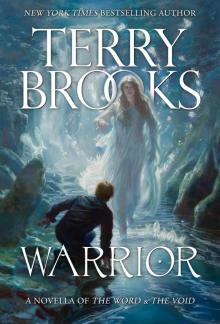 Warrior (The Word and the Void)
Warrior (The Word and the Void)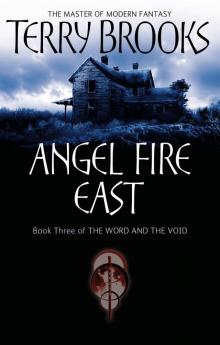 Word & Void 03 - Angel Fire East
Word & Void 03 - Angel Fire East![[Magic Kingdom of Landover 05] - Witches' Brew Read online](http://i1.bookreadfree.com/i2/04/05/magic_kingdom_of_landover_05_-_witches_brew_preview.jpg) [Magic Kingdom of Landover 05] - Witches' Brew
[Magic Kingdom of Landover 05] - Witches' Brew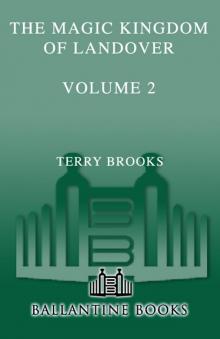 The Magic Kingdom of Landover - Volume 2
The Magic Kingdom of Landover - Volume 2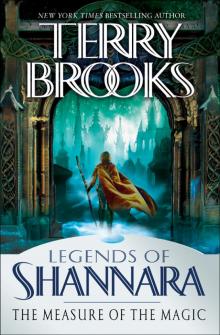 The Measure of the Magic
The Measure of the Magic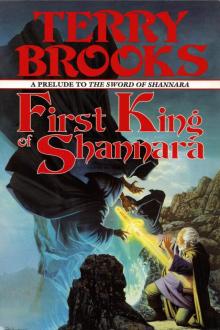 The First King of Shannara
The First King of Shannara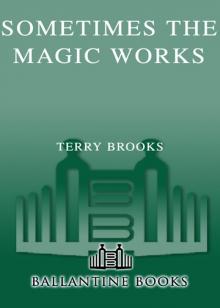 Sometimes the Magic Works
Sometimes the Magic Works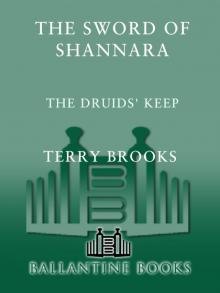 The Sword of Shannara, Part 2: The Druids' Keep
The Sword of Shannara, Part 2: The Druids' Keep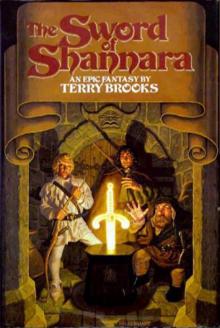 The Sword of Shannara tost-1
The Sword of Shannara tost-1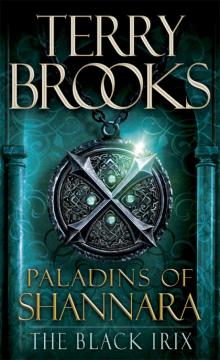 Paladins of Shannara: The Black Irix (Short Story)
Paladins of Shannara: The Black Irix (Short Story)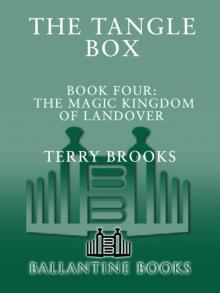 Tangle Box
Tangle Box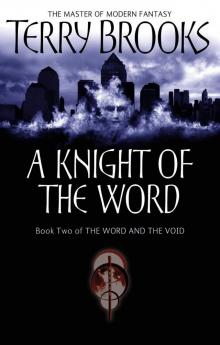 Word & Void 02 - A Knight of the Word
Word & Void 02 - A Knight of the Word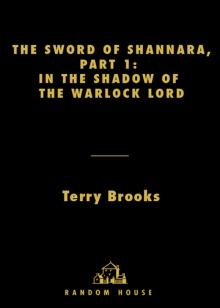 The Sword of Shannara, Part 1: In the Shadow of the Warlock Lord
The Sword of Shannara, Part 1: In the Shadow of the Warlock Lord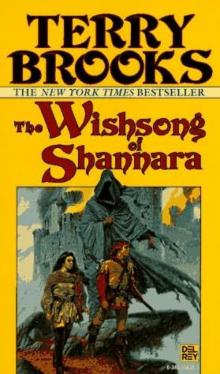 The Wishsong of Shannara tost-3
The Wishsong of Shannara tost-3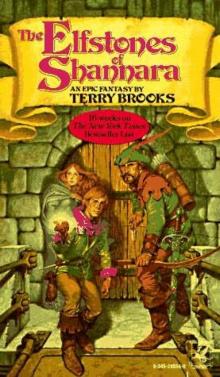 The Elfstones of Shannara tost-2
The Elfstones of Shannara tost-2